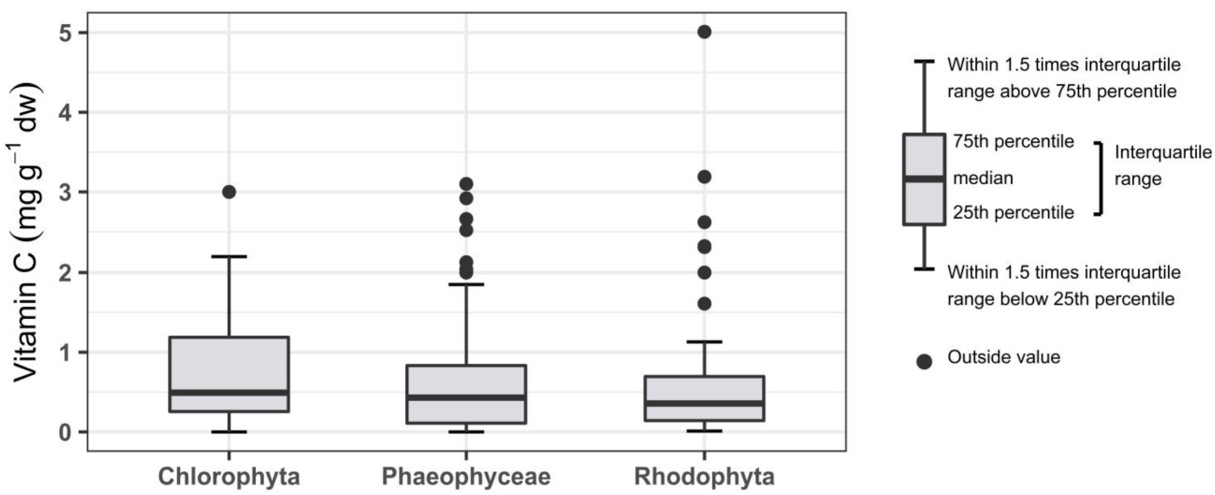Seaweed Vitamers Quantitative Analysis Service
Your Trusted Partner for Accurate Seaweed Vitamin Analysis
Seaweeds contain nutrients, including a variety of vitamins of interest to human health. Analyzing the vitamin content of seaweeds helps provide valuable information about their nutritional value and potential health benefits. Creative Biolabs provides a reliable, professional, and custom seaweed vitamin analysis service to support our client's research needs on seaweed nutrients, biotransformation, and more.
We are constantly optimizing our capabilities to be the most professional partner for the analysis of Seaweed and other Biomass for researchers. The vitamin content in seaweed is low. We use ion chromatography to identify all kinds of samples and detect the changes in vitamin content in seaweed efficiently and accurately. According to their solubility and chemical structure, vitamins are divided into two groups: fat-soluble vitamins and water-soluble vitamins. According to the nature of different vitamins, we have established an ion chromatography analysis system to maximize the accurate qualitative and quantitative analysis of the following vitamins.
-
Fat-soluble vitamins: β-Carotene, vitamin D2, vitamin K1, vitamin E.
-
Water-soluble vitamins: Vitamin B1, niacin, vitamin B5, vitamin B12, vitamin B6, vitamin B9, vitamin B2, niacinamide, vitamin C.
Each of these seaweed samples is tested in duplicate for vitamin content.
 Fig.1 Flowchart for quantitative analysis of vitamins in seaweeds.
Fig.1 Flowchart for quantitative analysis of vitamins in seaweeds.
Features of Seaweed Vitamin Analysis Service
-
Extensive expertise and experience: We have an experienced analytical team responsible for seaweed vitamin analysis. They have an in-depth understanding of the complexity of seaweed matrices and the techniques required to accurately quantify vitamins.
-
Transparent projects: We report the progress of our experiments to our clients promptly, from the initial communication to the final analytical report.
-
Strict quality control system: We use a strict quality testing system to ensure the accuracy and reliability of our seaweed vitamin analytical data.
Creative Biolabs uses highly efficient and reliable ion chromatography for the detection of fat-soluble and water-soluble vitamins in seaweed. In addition to vitamins, we also detect Fatty Acids, Elemental Composition, Phytohormones, and other substances in seaweed. Please feel free to contact us to learn more about seaweed vitamin analysis if you are interested in our services.
Published data
Seaweeds are a rich source of vitamin C. Scientists have studied vitamin C in different species of seaweed. The present study synthesized the literature data and analyzed them statistically. It briefly discussed the analysis methods and emphasized the effect of treatments on vitamin C content. The analysis revealed that according to the taxonomic categories of brown, red, and green seaweeds assessed for vitamin C content, no significant differences were found between them. In comparison with other food sources, seaweeds contribute to the daily intake of vitamin C but are not an abundant source. In addition to this, season, harvesting location, biological variation, sample handling or other factors could affect the content of vitamin C. Through this study, we learn some means of vitamin C detection, which supports us in optimizing the microbiological analysis methods in seaweeds.
 Fig.2 Data analysis of vitamin C content.1, 2
Fig.2 Data analysis of vitamin C content.1, 2
FAQs
Q1: Why is it important to analyze seaweed for vitamins?
A1: Seaweeds are rich in nutrients as they contain various microorganisms and phenolic substances. The vitamin content of seaweeds varies due to biological factors, and seasonal and environmental differences. Vitamin analysis of seaweeds helps to understand and quantify the vitamin content of different seaweed species. In addition to providing valuable information on the nutritional value and potential health benefits of seaweed, it also contributes to the development of food and seaweed products.
Q2: What analytical techniques are used for seaweed vitamin analysis?
A2: A variety of analytical techniques can be used for seaweed vitamin analysis, such as ion chromatography, liquid chromatography-mass spectrometry, and spectrophotometry. These techniques are highly sensitive and can accurately detect, identify, and quantify various vitamins in seaweed samples.
Customer Review
Professional and Outstanding Analysis Service
"We were very happy to be working with Creative Biolabs. Their dedication to client satisfaction and professionalism was commendable. Throughout the process, the team was very responsive and kept us informed at every stage of the seaweed vitamin analysis. We were also particularly impressed with the precision and accuracy of the analysis results. The seaweed vitamin analysis service they provided for us was excellent."
Perfection in the Pursuit of Accurate Results
"Creative Biolabs is a leader in seaweed analysis. We have been impressed with the quality of their seaweed vitamin analysis service and their professionalism. From the initial inquiry to the receipt of the analytical report, their team has demonstrated a high level of expertise and dedication to accurate results. They used advanced analytical techniques to ensure the reliability of the data obtained. We were also very satisfied with the team's professionalism and clear communication. We look forward to working with them again."
References
-
Nielsen, Cecilie Wirenfeldt, Turid Rustad, and Susan Løvstad Holdt. "Vitamin C from seaweed: A review assessing seaweed as contributor to daily intake." Foods 10.1 (2021): 198.
-
Under Open Access license CC BY 4.0, without
For Research Use Only.
Related Services

 Fig.1 Flowchart for quantitative analysis of vitamins in seaweeds.
Fig.1 Flowchart for quantitative analysis of vitamins in seaweeds.
 Fig.2 Data analysis of vitamin C content.1, 2
Fig.2 Data analysis of vitamin C content.1, 2



